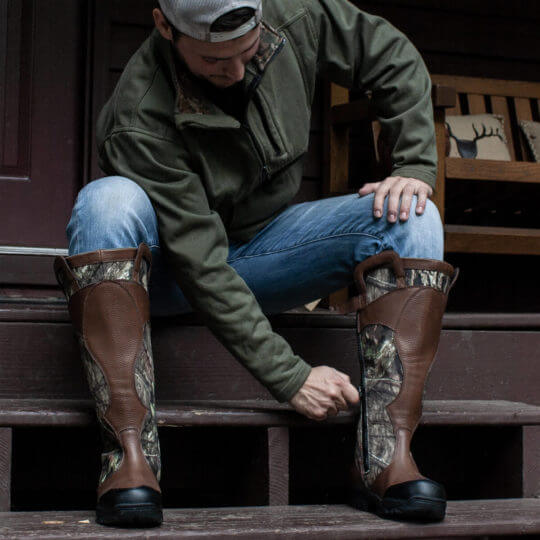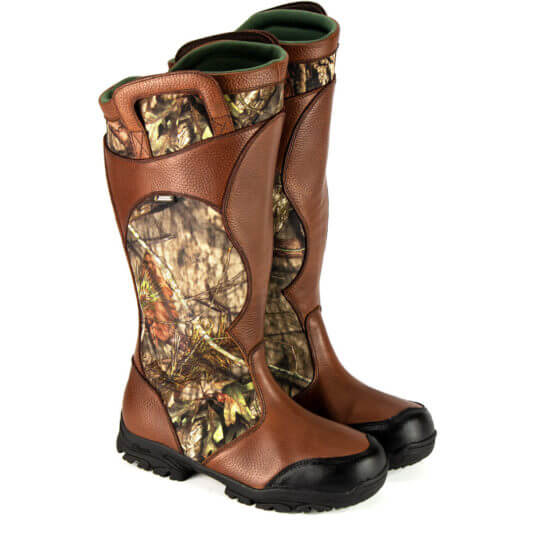Snake Proof Hunting Boots – Do I Need Them?
 With spring hunting season around the corner, you better believe that snakes will be coming out after brumation. Warmer weather systems warm their blood and make them active, so starting in March or April you can expect to start spotting snakes on trails and while you’re out hunting, making snake proof hunting boots a necessity.
With spring hunting season around the corner, you better believe that snakes will be coming out after brumation. Warmer weather systems warm their blood and make them active, so starting in March or April you can expect to start spotting snakes on trails and while you’re out hunting, making snake proof hunting boots a necessity.
Spring brings great opportunities for hunters – there are turkey, prairie dogs, bear, and hog hunts. But with the adventure also comes the potential danger of stepping on or upsetting a hidden snake. Since they often hide under rocks, logs, leaves, and in tall grass, they can be hard to spot. They’re also easily overlooked when your main focus is to concentrate on finding your target.
Fun Fact – Snakes have poor eyesight and rely on quick movements and ground vibration to locate their prey. If you find yourself accidentally near one, don’t make sudden movements – walk away slowly and quietly. Not that that helps if you’ve stepped straight on them.
Can Snakes Bite Through Rubber Boots?
Yes. Yes, they can. The good news is that not all snakes have fangs strong enough to go through rubber boots. When snakes strike and the fangs sink into their target, they don’t necessarily know whether they’ve broken skin or pierced a boot. Basic rubber boots aren’t made of the same quality materials or components as an outdoor hunting boot or waterproof snake boot. What you wear on your feet can make or break a hunt, especially if you’re wearing cheap rubber boots that are uncomfortable, cold, and unprotective. Quality snake proof hunting boots are designed to keep you dry, warm, and armored, whether you’re going out for a quick after-work hunt or a 3-day hunting trip. Features like side zips make them easier to put on than pulling on a rubber boot, and they’re sure to outlast cheaper, lower quality rubber footwear.
Can Snakes Bite Through Leather Boots?
Sometimes. Some snakes can bite through leather but not all have the power to pierce a tough leather material nor the fang length to make skin contact. If you’re hunting in rough terrain, a sturdy pair of taller leather boots with a safety toe is a great option for protecting your feet and ankles from sprains. A composite toe is lighter than steel, making them ideal for longer treks, and they can even be paired with snake gaiters for spring and summer months when snakes are more active.
So, how long are snake fangs?
Not all snakes have fangs, since not all snakes use venom to overtake their prey. And some only have fangs in the back of their mouth. There’s no universal distinction to separate venomous and nonvenomous snakes, so it’s important to be familiar with dangerous species in the areas you’ll be hunting. Snake fangs also differ in length, so just because they have longer fangs doesn’t mean they’ll be able to bite through a well-designed pair of snake boots.
In fact, Thorogood snake boots go through live testing with real rattlesnakes before being released to the public. First, the boot shank is filled with balloons and handlers entice rattlesnakes to bite them. If the boot passes the test, it moves on to a second stage where people wearing our snake boots cause the rattle snakes to strike them. It’s only after this vigorous testing process that our boots move on to consumers. So, if you’ve ever wondered whether snake proof boots work, rest assured that ours do.
What Makes a Boot Snake Proof?
 Boots created specifically to be snake proof have additional features for protection. They’re typically somewhere in the range of 14 to 18 inches tall and have plated snake bite prevention features either within the boot shaft layers or an overlay. Toe boxes are also important, since snakes can strike lower on the foot area, and a good pair of snake boots will make sure to keep your feet shielded with additional materials.
Boots created specifically to be snake proof have additional features for protection. They’re typically somewhere in the range of 14 to 18 inches tall and have plated snake bite prevention features either within the boot shaft layers or an overlay. Toe boxes are also important, since snakes can strike lower on the foot area, and a good pair of snake boots will make sure to keep your feet shielded with additional materials.
*Some boot manufacturers actually use live specimen testing to answer the popular questions of can snakes bite through rubber boots and can snakes bite through leather boots before releasing their snake proof hunting boots on the market.
Do Snake Proof Boots Work?
Snake proof boots are not 100% guaranteed to be effective, but they’re definitely a good snake bite prevention tactic. Plus, snake proof hunting boots have other features that make them a worthwhile investment (especially ours ????).
Snake proof boots on the market vary in quality and in how they’re made. Some boots have their protection plates on the outside of the boot, while others lay puncture-resistant plates within layers of the boot construction. All aim to protect your toes, feet, ankles, and calves from a potential snake bite. We can’t speak for how others are tested, but since our snake boot tests use real live rattlesnakes, we’re pretty confident with their strength and durability.
Another snake bite prevention tactic is “dead air,” a term used to describe the air between our clothing or footwear and skin. When a snake strikes at a human, it’s typically used as a warning and is meant to be a quick movement, often lacking precision. Because of this, a snake might make quick contact with clothing or boots and not sink its fangs deeper. Hunters recommend wearing loose and rugged clothing like denim or a canvas material to create the dead air barrier. Snake proof hunting boots are also loosely fitting, following the same dead air concept.
Are Snake Boots Worth it?
 Snake boots are worth the investment for people who hunt regularly in spring and summer through snake-dense areas. A solid pair of good quality snake proof hunting boots will average around $200, which is just barely more than a good pair of rubber hunting boots. We’d rather spend a little bit more on snake bite prevention than a whole lot more on anti-venom injections and medical bills. The southeastern and southwestern areas of the U.S. tend to have more snakes than northern states because of higher average temperatures.
Snake boots are worth the investment for people who hunt regularly in spring and summer through snake-dense areas. A solid pair of good quality snake proof hunting boots will average around $200, which is just barely more than a good pair of rubber hunting boots. We’d rather spend a little bit more on snake bite prevention than a whole lot more on anti-venom injections and medical bills. The southeastern and southwestern areas of the U.S. tend to have more snakes than northern states because of higher average temperatures.
If you’re unsure if snake proof hunting boots are needed where you’ll be hunting, consider that the only snake-free states are Alaska and Hawaii. So if the fact that some snakes can bite through rubber boots, isn’t persuading enough, the large population of snakes across the U.S. might. Snake protection aside, a sturdy pair of waterproof snake boots are a durable and comfortable option for long hunting days.
